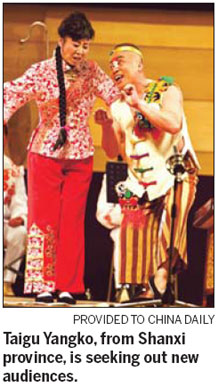Life and Leisure
Traditional rural opera goes to market
By Sun Li (China Daily)
Updated: 2010-12-14 08:06
 |
Large Medium Small |
A series of Taigu Yangko performances recently staged in Beijing and Tianjin are breathing new life into a traditional opera style that dates back to the Ming Dynasty (1368-1644).
Yangko originates from Taigu county, Shanxi province, and was listed as a State-level intangible cultural heritage in 2008. Performers typically dress like farmers and sing in a local dialect, and the repertoire explores every aspect of rural life.
"Although Taigu Yangko is culturally and historically important, the traditional art is fading," says Chang Cheng, director of the culture bureau of Taigu county. "That's why we are presenting it in other regions. Previously we seldom performed outside our county but now we want to enhance its appeal."
To make the opera more interesting and lively, the troupe of 27 performers from Taigu, experimented by adding new facets to their performances.
First, explanatory subtitles were added on the screens in the theater so audiences could follow the vernacular language.

"The language we use in Taigu Yangko is an important part of the opera's value and glamour," says Dong Meixian, 46, an award-winning performer. "Even though we want more people to understand it, we won't change the libretto into Mandarin."
Like Peking Opera, Taigu Yangko is always accompanied by string instruments, drums and clappers. For the shows in Beijing and Tianjin a computer with sound-editing software was used, which embellished the story with complicated sound effects, like the sound of poultry.
There is also more interaction between the actors on the stage and the musicians accompanying them.
In a classical piece titled Cursing Chicken, a woman farmer calls out every villager's name because she thinks someone has stolen her chicken. Then, she suddenly points at a girl playing the erhu and treats her like a suspect.
When the girl responds with an innocent look and a cute smile, the audience bursts into laughter.
"Through such changes, we want to revive Yangko," Dong says. "But to protect the opera, we also need more young performers."
Dong says the Shanxi provincial government has strengthened Yangko education and she is glad many members of the troupe are students from different art colleges in the province.
"The performances we give these days in Beijing are a precious opportunity for rookie actors to practice their art," Dong says. "I hope they can perfect their skills as soon as possible and fill the void left by 'old people' like me someday."
Chang Cheng says a Taigu Yangko promotion campaign targeted at university students will be launched in the near future, aiming to attract youthful and educated people from across the country.